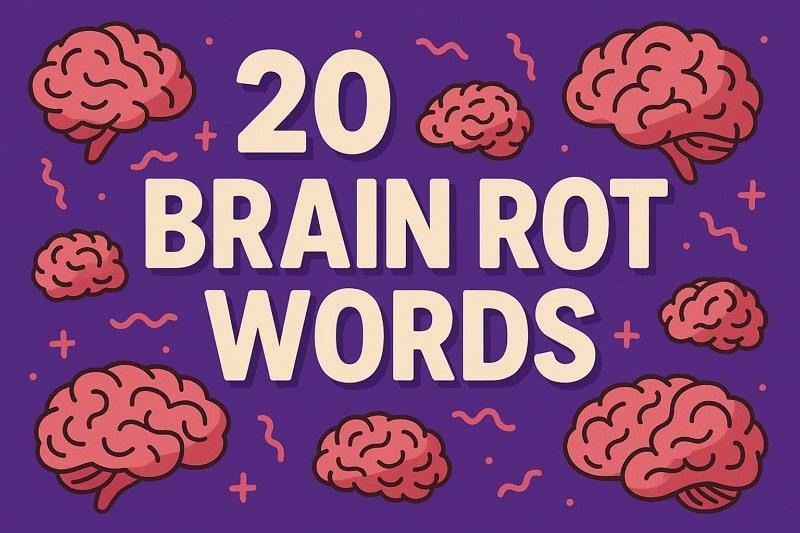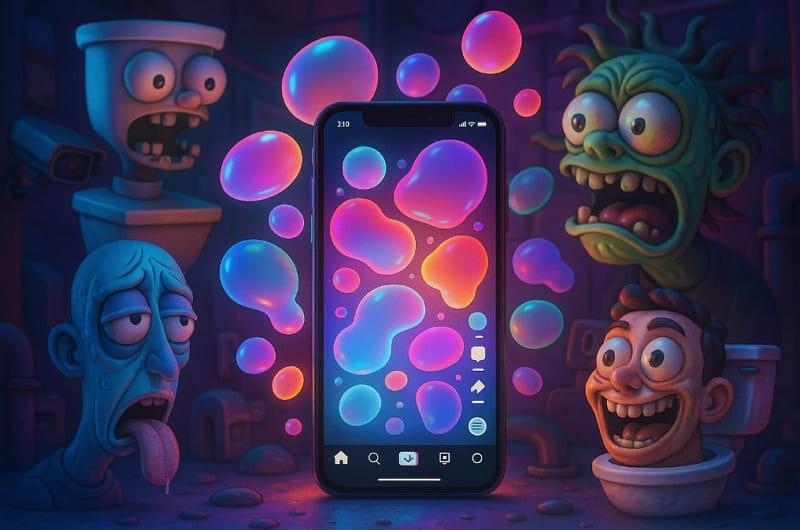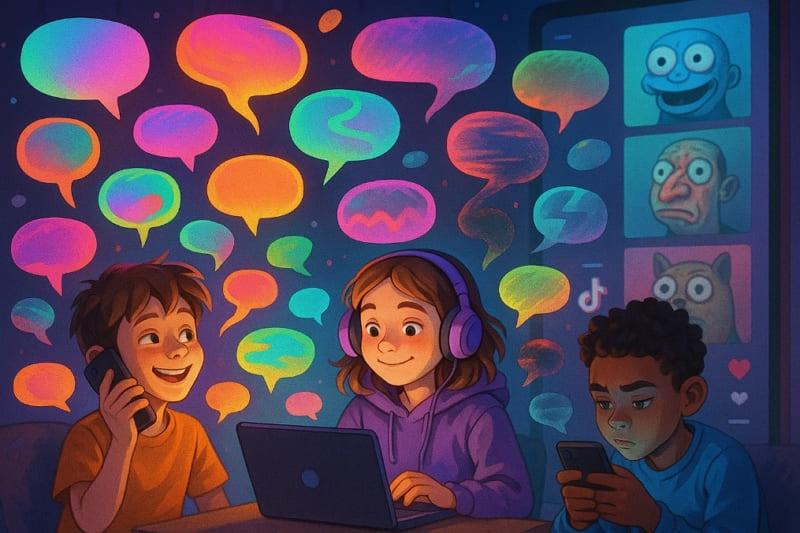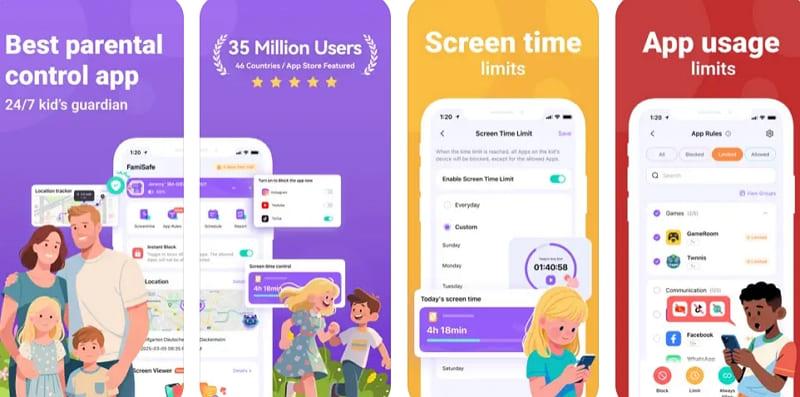Scrolling through your child’s TikTok or chat and stumbling upon words that make zero sense can feel like decoding a secret code. Terms like “Rizz” or “Skibidi” may look funny, but they often leave parents confused or even worried. These brain rot words represent a new wave of Gen Z and Gen Alpha slang that spreads rapidly online, creating a communication gap between kids and parents.
That’s why understanding the brain rot words list 2025 matters. This guide decodes the 20 most common terms, explains why kids love them, and highlights potential risks. Most importantly, we’ll show how tools like FamiSafe parental control can help parents detect slang and guide safer digital communication—without cutting kids off from their culture.

Table of Content
Part 1. What are Brain Rot Words?
Brain rot words are viral slang terms that explode across platforms like TikTok, YouTube Shorts, and Discord. Originally, “brain rot” described the mental fog from consuming endless low-value content. Today, it has expanded into a slang universe filled with nonsense words, exaggerated reactions, and meme phrases.
For example, “Ohio” memes represent bizarre events, while “Gyatt” or “Rizz” are used to comment on appearance or flirting ability. Unlike traditional slang, these phrases rarely have a fixed meaning—they act as inside jokes or viral reactions within online communities.

👉 According to Urban Dictionary, “brain rot” also reflects the endless remixing of meme culture, where language mutates daily. This makes it especially hard for parents to keep up, but also crucial to monitor.
Part 2. 20 Brain Rot Words List in 2025
Here’s the updated list of brain rot words in 2025. Parents can use this as a quick dictionary to understand what kids are saying:
| Word/Phrase | Meaning/Usage |
| Gyatt | Meme word highlighting someone with noticeable curves (especially a big butt). |
| Zesty | A high-energy word for “slay”; conveys excitement or fabulousness in meme culture. |
| No cap fr ong | Mash-up slang: “I’m seriously not lying, fr (for real), ong (on God).” |
| Skibidi | Absurd filler term from Skibidi Toilet memes; means anything silly or surreal. |
| Rizz / Rizzler | “Rizz” = charisma/flirting ability. “Rizzler” = person skilled at rizz. |
| Main NPC | Flip of “NPC”; refers to someone living like the main character, not a background extra. |
| Glazing | Overpraising or complimenting someone excessively, often sarcastically. |
| Delulu | Short for “delusional,” playfully mocking unrealistic hopes or fantasies. |
| Doomscrolling | Mindlessly scrolling content for hours, linked to “brain rot.” |
| Ohio | Meme phrase for bizarre/surreal happenings: “Only in Ohio.” |
| Sigma | Lone-wolf archetype; often tied to masculinity and independence memes. |
| Mewing | Facial exercise trend to sharpen jawline; part of “looksmaxxing” culture. |
| Aura | Describes someone’s intangible vibe, presence, or energy. |
| Sybau | Acronym: “Shut your bitch ass up,” a blunt online insult. |
| Cringe | Describes awkward, embarrassing, or try-hard behavior. |
| Ghosting | Cutting off communication suddenly without explanation |
| 6-7 | Viral nonsense phrase from TikTok drill rap “Doot Doot.” |
| Mamma mia | Dramatic Italian exclamation in meme edits/Italian Brain Rot videos. |
| Looksmaxxing | Self-improvement trend focused on maximizing appearance. |
| Goon | Refers to someone obsessively binging memes/games/content to the point of fixation. |
Part 3. Why Kids Use Brain Rot Words and the Risk?
Now that you’ve seen the TikTok brain rot words list, you might be wondering why kids are so drawn to these quirky, gibberish-like terms. While they may seem like just harmless fun, the real question is what makes these words stick and what risks come with them.
Why Kids Use Brain Rot Words
- 👥Peer Power: Kids use brain-rot slang to fit in with their peers and shape their social identity, creating an instant sense of friendship and shared belonging. As slang is strongly tied to specific online communities, using terms signals membership and aligns them with group norms and humor.

- ⚡Trend Spark: Brain rot words thrive on novelty and catchy appeal, making them memorable and easy to spread, perfect fuel for viral trends online. Children eagerly adopt these quirky phrases because they are playful and thrive across platforms, satisfying both creative expression and rapid digital consumption.
- 🚪Rule Bending: Slang provides an indirect means of defiance, enabling children to develop a mode of expression that adults fail to comprehend, thus protecting a confidential secret code. Kids use these words as a way to connect with each other while keeping their own space from adults.
Risks Parents Shouldn’t Ignore
- 🧠Cognitive Strain: Constant exposure to rapid-fire, trivial online content with obsessive use of meaningless slang can contribute to reduced attention spans and even elevated anxiety or depressive symptoms. These effects resemble the concept of brain rot, where overconsumption of low-value media physically and behaviorally weakens mental health over time.
- 📉 Language Decline: When children rely heavily on meme-based shorthand like Rizz or Gayatt, they risk losing the ability to express complex thoughts or emotions with depth and clarity. Over time, this can damage conversational skills and strain academic performance, as their vocabulary becomes narrowed and contextually blurred.
- 🚨 Hidden Harassment: Sexual allusions may be concealed in a light-hearted meme and normalize undesirable or even harmful behavior. Unless parents are aware of it, the meme can spread without anyone noticing that it is a threat. This coded language is meant to evade moderation and may cause emotional injury, low self-esteem, and cyberbullying.
Part 4. How to Detect Brain Rot Words in Kids’ Online Language
The brain rot words list reveals that, while most terms are harmless, a few inappropriate or risky words can easily slip in. This is why parents should never let it slide and keep track of their kids' vocabulary; for that, they can use FamiSafe.

This is where FamiSafe helps parents stay in the loop:
- 🔍 Keyword Alerts – Instantly flag slang terms in kids’ chats.
- 📊 Activity Reports – Weekly summaries of online behavior and slang trends.
- 📱 Social App Monitoring – Detects slang across TikTok, Instagram, Discord, and more.
- 🌐 Web Filter – Blocks access to unsafe meme sites or slang-driven platforms.
By combining keyword monitoring with context analysis, FamiSafe ensures parents can protect kids—without isolating them from digital culture.
Conclusion
In 2025, brain rot words may seem like funny nonsense, but they shape how kids talk, connect, and sometimes hide risky behavior. Instead of banning slang, parents should focus on understanding and guiding. With the help of tools like FamiSafe, you can stay updated on slang trends, especially popular TikTok slangs, protect kids’ digital safety, and still let them enjoy online culture responsibly.
Frequently Asked Questions
-
Can brain rot words affect a child’s communication skills long-term?
If kids rely too heavily on these words, they may struggle to express themselves clearly since constant use can reduce their vocabulary range. However, with guidance and exposure to balanced communication, most children naturally separate playful slang from proper language use over time. -
Should parents ban brain rot words completely?
A strict ban usually backfires, making kids more likely to hide their conversations or rebel by using slang even more. Instead, respectful communication is more important, and it's better to teach when it’s appropriate to use casual terms and when it's clear. -
How can I keep up with the latest brain rot words my kids use?
The trends are evolving rapidly, and the parents may keep abreast of them by observing platforms like TikTok. Certain parental control apps, such as FamiSafe, can assist in this by alerting them to terms, like Gen Z brain-rot slang words.


